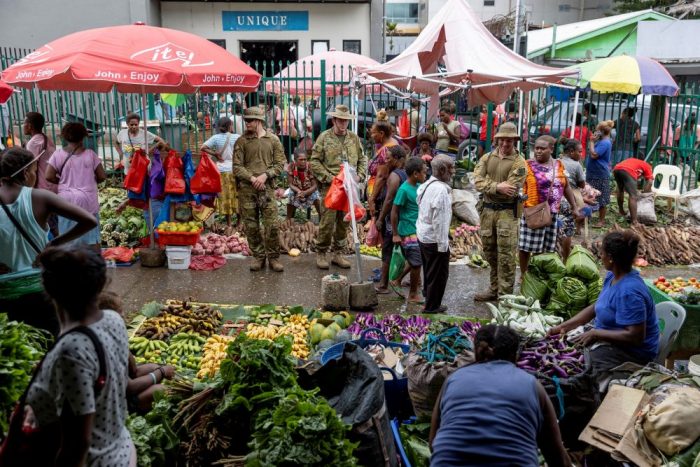
There is strong opposition in Solomon Islands to Prime Minister Manasseh Sogavare’s security deal with China, says the nation’s opposition leader, Matthew Wale.
Wale tells The Strategist those opposed to the deal include members of Sogavare’s government.
Most Solomon Islanders regard Australia with great fondness and remember well its sacrifices for their country, he says. They do not want any sort of security arrangement with China, and they’ll be very concerned about this one being signed.
‘It’s clear to me that the vast majority of ordinary Solomon islanders do not want a base here, or even this deal. A majority do not want China here at all in the first place,’ says Wale.
He says that was made very clear during the violence targeting Chinese interests in last year’s riots that saw Australian police and military personnel sent in to help keep the peace. That violence was criminal and opportunistic, Wale says. ‘With or without China, we don’t want Chinese businesses being targeted.
‘We share similar concerns as Australia in terms of the consequences of this for the region. Australia’s been a very reliable partner to the Solomons and the rest of the region over many years.’
Wale says the only way the deal can be reversed now is if there’s a change of government in the Solomons or a change of prime minister.
And could that happen? ‘Oh, absolutely it can happen,’ he says. Those opposed to the deal include some of Sogavare’s ministers.
‘We are definitely going to make it an election issue.’
Sogavare could be removed through a motion of no confidence, but that did not succeed when the opposition moved such a motion in November.
His government might succeed in postponing next year’s elections, Wale says. If it doesn’t postpone them, parliament should be dissolved in about May 2023 and elections would have to be held within four months.
Wale says the China deal should have been headed off in the middle of 2021. ‘We’ve known for some time that this was in the works, and Australia ought to have known. I had expected that Australia would’ve done something to nip it in the bud.’
Australia is the biggest donor to the Solomons and addresses fundamental issues and development needs, Wale says. ‘We appreciate that very much but, given what’s happening, I think Australia needs to be a little bit more creative and be deliberate about building its own capital here, social–political capital, and getting some respect for it and not be expected to be an ATM machine—you push the right buttons and cash comes out.’
He says Australia could have made its views clear while negotiating its aid to the Solomons when it could exert significant influence. Exploratory discussions between China and Sogavare were already underway then. ‘Australia could have flexed its muscle some, and I think it could have affected it, or at the very least make him rethink and postpone it a year or two, that could allow greater public discourse over it.’
So, what can Australia do now?
Wale says the upcoming Pacific Games are a big deal for Sogavare and some of his ministers, and they want to be able to deliver them. Much of the infrastructure such as stadiums has been funded by China, but considerable work is being paid for by Australia and New Zealand. Australia could say it wants to review that spending.
If Australia, the United States and other aid donors coordinate their actions, that could carry significant collective weight, he says. It could make Sogavare think twice.
But Wale concedes that if China does want to establish a significant military presence in Solomon Islands it might see that strategic development as such an important prize that it could be prepared to cover the cost of aid lost from other nations such as Australia. ‘That is true, yes.’
He says the lack of transparency around the China–Solomons agreement means Australia could quite legitimately impose some form of financial sanctions on those involved. Brisbane is the gateway to the rest of the world for Solomon Islanders, says Wale.
‘If there were sanctions, of course that’s going to be extreme, but it is a tool that could be used, and the lack of transparency around this agreement deserves to be treated with the worst-case calculations.’

